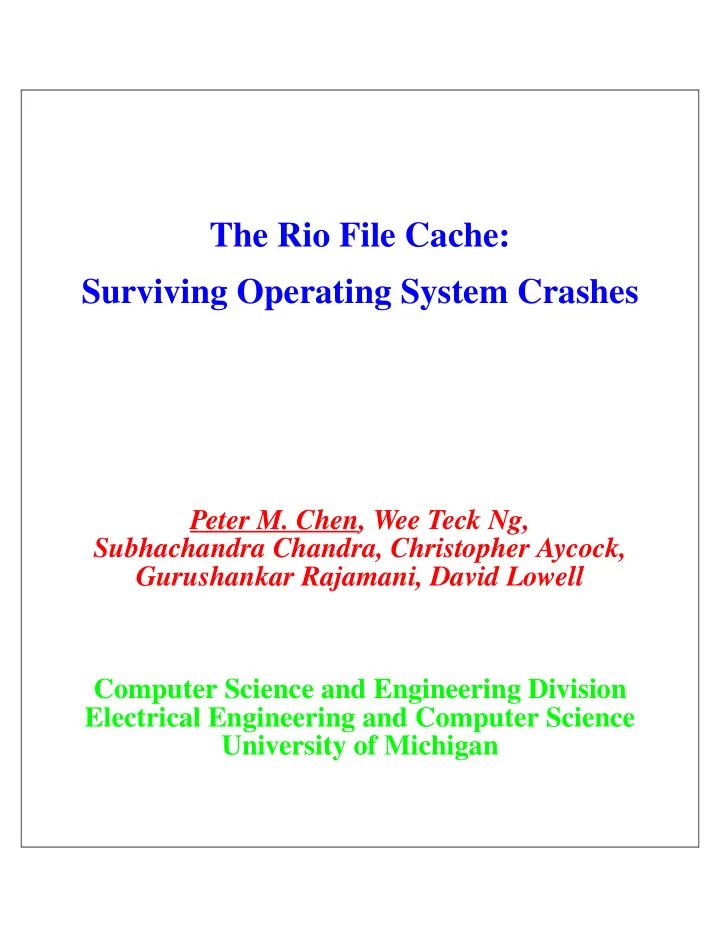

The Rio File Cache: Surviving Operating System Crashes Peter M. Chen, Wee Teck Ng, Subhachandra Chandra, Christopher Aycock, Gurushankar Rajamani, David Lowell Computer Science and Engineering Division Electrical Engineering and Computer Science University of Michigan
Problem: Memory Unsafe for Files Limits effectiveness of file cache [Baker91] 100 % Bytes Deleted 80 60 40 20 0 1 10 100 1K 10K 100K 1M Delay (seconds) Forces trade-off between reliability and performance write-through delayed write write-back best best reliability performance e.g. TP e.g. mfs
What Makes Memory Unreliable? Vulnerable to power loss fix with UPS (battery) or Flash RAM Vulnerable to software errors/system crashes “ Ordinary RAM memory...is wiped out when...a machine crashes ” [Tanenbaum95] “ Volatile storage does not usually survive system crashes ” [Silberschatz94] “ ...safe from some software errors that write over main memory ” [Hennessy/Patterson96] Disk vs. memory interface writes to disk must go through complex protocol, error checking any kernel store can write files in memory
Rio: A Reliable File Cache reboot protect memory restore memory during crash during reboot Remove reliability-induced writes to disk (sync, fsync, bwrite, bawrite) Platform: DEC Alpha (128 MB memory), Digital Unix V3.0
Protect Memory by Controlling Access Start with VM’s write protection file cache pages normally kept write-protected unauthorized writes trigger exception file cache routines unprotect page before writing, reprotect and verify page after writing But physical addresses can bypass VM Force all addresses through VM extra address map translates physical addresses disable writes to file cache pages low overhead
Warm Reboot Assuming file cache is preserved during crash, how to easily restore during reboot? What additional data to maintain before crash? could use existing kernel data structures, but must protect each structure registry of essential info: physical memory address, device number, disk address, inode, file offset Sync data/metadata to disk when reboot begins
Crashing the Operating System Fault models: goal is wide variety and realism Fault Type Example of Programming Error destination register numFreePages = count(freePageHeadPtr) source register numPages =physicalMemorySize/pageSize delete branch if while (...) {body} delete random inst. for (i=0; i<10; i++,j++) {body} initialization function () {int i=0; ...} pointer ptr = ptr->next -> next; allocation ptr = malloc(); use ptr; use ptr; free(ptr); copy overrun for (i=0; i<sizeUsed; i++) {a[i] = b[i]}; off-by-one for (i=0; i < <= size; i++) synchronization getWriteLock; write(); freeWriteLock;
Reliability Results Rio without Rio with Fault Type Disk-Based Protection Protection kernel text 2 1 kernel heap kernel stack 1 1 destination register source register 2 delete branch 1 1 1 delete random inst. 1 initialization 1 pointer 1 allocation copy overrun 4 off-by-one 1 2 1 synchronization 7 of 650 10 of 650 4 of 650 Total (1.1%) (1.5%) (0.6%) MTTF With Crash Every 2 15 years 11 years 27 years Months
UFS 10 15 0 5 MFS UFS-delay AdvFS cp+rm UFS write-through-on-close UFS write-through-on-write Rio without protection Speedup Relative to UFS Rio with protection Sdet Andrew
Conclusions Rio makes memory as safe as disk Benefits reliability: all writes immediately and synchronously permanent performance: no reliability-induced writes to disk rio.eecs.umich.edu running Rio file system with protection stores our home directories, Rio source tree, mail
Recommend
More recommend